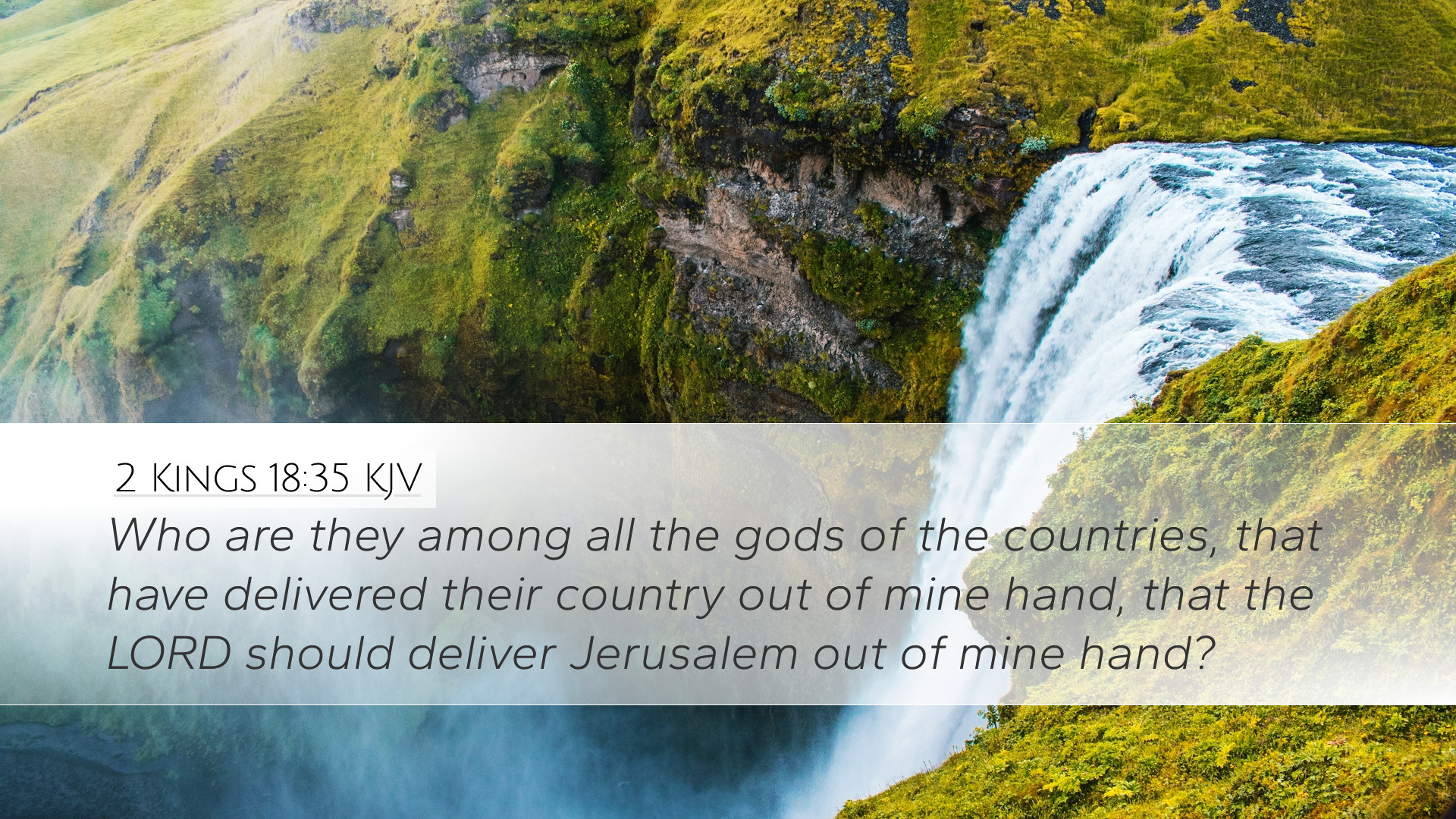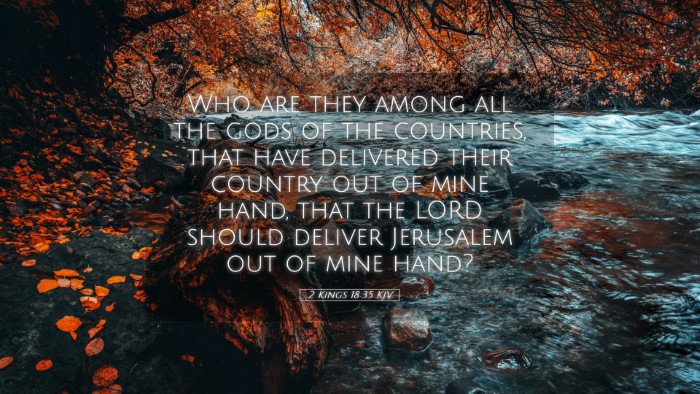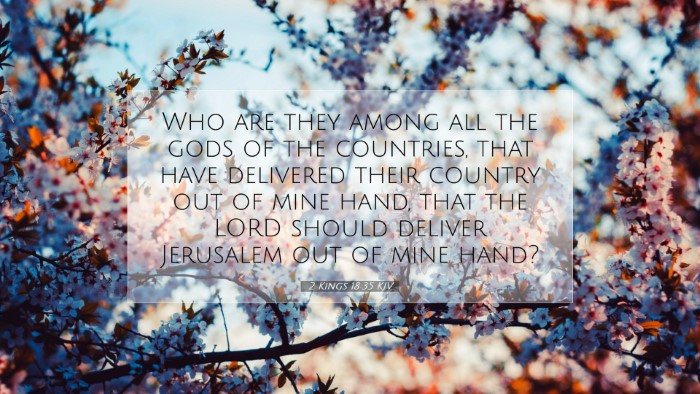Commentary on 2 Kings 18:35
Verse: "Who are they among all the gods of the lands, that have delivered their land out of my hand, that the LORD should deliver Jerusalem out of my hand?" (2 Kings 18:35)
Introduction
This verse captures a critical moment in the historical narrative of the Kingdom of Judah during the reign of King Hezekiah. The Assyrian king, Sennacherib, challenges the efficacy of the God of Israel by comparing Him to the gods of other nations, emphasizing the futility of resistance against his overwhelming military might.
Historical Context
During the period described, Assyria was the dominant power in the ancient Near East, known for its ruthless military campaigns and conquests. Hezekiah was faced with the daunting task of trusting in Jehovah amidst the threats posed by Sennacherib, who had already successfully subjugated other nations, including Israel. Sennacherib’s taunt not only illustrates his arrogance but also serves as a pivotal moment for the Israelites regarding their faith and reliance on God.
Commentary Insights
1. View on Idolatry and Faith
Matthew Henry's Commentary:
Henry emphasizes that Sennacherib’s question reflects the common misconception that deities are merely tribal in nature, powerless beyond their own geographic domains. His inquiry points to the broader theme throughout Scripture: the living God’s sovereignty over all nations is not confined by geographic boundaries or limited by man-made idols.
Albert Barnes’ Commentary:
Barnes expounds that Sennacherib attempts to instill fear in the populace of Jerusalem by recalling the failures of other nations' gods. Writing during a time when human logic and strength seemed to overshadow faith, Barnes notes that Sennacherib's ridicule was designed to weaken the resolve of the Judean people by portraying God as ineffective.
Adam Clarke's Commentary:
Clarke highlights the importance of divine intervention. His commentary suggests that Sennacherib’s attitude reflects a deeply ingrained pride, setting up a false contrast between the God of Israel and the idols of the nations. Clarke reminds readers that the true God demonstrates His power through miraculous events, irrespective of human ability or the apparent strength of the enemy.
2. The Nature of God’s Deliverance
Matthew Henry:
Henry illustrates that the question posed by Sennacherib serves not only as a challenge but as an opportunity for divine demonstration. He notes that while Sennacherib was focused on a strategy of intimidation, God had plans for a miraculous deliverance that would affirm His sovereignty and faithfulness to His people.
Albert Barnes:
Barnes observes that the rhetorical nature of Sennacherib's challenge reveals his ignorance of the sovereignty of God. By mocking the God of Israel, he inadvertently sets the stage for God to reveal His awesome power through the impending act of deliverance, showcasing that no earthly power can stand against divine will.
Adam Clarke:
Clarke emphasizes that the historical recollection of deliverance instances, such as the Exodus from Egypt, serve to bolster faith in God's ability to save. He notes that the challenge is not only against Jerusalem but is ultimately a challenge against God Himself, which will have serious ramifications.
3. The Response of Hezekiah and the People
Matthew Henry:
Henry points out that Hezekiah’s leadership during this crisis becomes crucial. Rather than respond in fear, the king directs his people to seek God through prayer and supplication. This response reinforces the central theme of reliance on God in times of trial and tribulation.
Albert Barnes:
Barnes stresses the importance of the people's reaction to Sennacherib's threats. By turning to God in humility and earnest prayer, they exemplify faithful reliance on the divine rather than succumbing to despair. Their response becomes a model for believers facing challenges in faith.
Adam Clarke:
Clarke emphasizes that Hezekiah’s righteous leadership and the people's unity in seeking God demonstrate a critical lesson in communal faith. Their actions form the basis of God's covenant promise, which ensures that those who turn to Him in times of trouble will always find refuge.
Theological Implications
This verse and the surrounding narrative provide profound theological insights regarding God's sovereignty, the nature of faith, and the reality of spiritual warfare. The arrogance of Sennacherib stands against the backdrop of God's ultimate authority and power. For pastors and theologians, this serves as a reminder of the necessity to trust in God amidst overwhelming odds and secular opposition.
1. Sovereignty of God
God's sovereignty is a central theme throughout Scripture, illustrated poignantly in this passage as He proves superior to earthly powers. The assertion that no other gods could provide deliverance ultimately leads to a better understanding of God's nature as a protector and savior.
2. The Role of Faith
In times of crisis, faith becomes the anchor for believers. The narrative surrounding this verse illustrates that true faith acknowledges God’s power and sovereignty, culminating in trust that provokes action—prayer, repentance, and communal solidarity.
3. Spiritual Warfare
This episode serves as a crucial reminder of the reality of spiritual conflict. The taunts of Sennacherib symbolize the voices of doubt and fear that pervade during trials. However, through prayer and reliance on God, believers are equipped to confront and overcome these challenges.
Conclusion
The rhetorical challenge of Sennacherib in 2 Kings 18:35 transcends mere historical discourse; it is a powerful reminder of God's unmatched power and the necessity for unwavering faith. As believers encounter modern-day challenges and 'gods' that threaten to divert their faith, this passage stands as a testament of God’s eternal truth: that no power on earth can stand against Him. For pastors, students, and scholars alike, this verse calls for deep reflection on their understanding of God’s sovereignty, the function of faith, and the nature of spiritual warfare.


